Dr Jessica Studer is the Swiss ESA-sponsored medical doctor (MD) of DC20, the twentieth crew to spend a winter at Concordia research station, which lies on the Dome C plateau of Antarctica. Jessica will spend a winterover from 2023 to 2024 doing biomedical research in Concordia, a place more remote than the International Space Station.
BLOG 1 – Concordia 25.01.24
First of all, a happy new year from Concordia Station! As the research MD of crew DC20, I’m excited to share my first blog post detailing the incredible journey that brought me to this remote corner of the world. It’s hard to believe that two months ago I set foot for the first time on this endless white ice surface, where Sascha (research MD for DC19) welcomed me. Today we are already living here as if we had never done anything else, but let’s begin at the very beginning.

Antarctica is not your typical travel destination and reaching Concordia station is an Odyssey in itself. My journey began with a train from Geneva in Switzerland to Paris, eventually leading me to the heart of this frozen continent.
In true Antarctic fashion, my arrival was marked by twists. Laden with excess luggage, navigating Paris during a metro strike and searching the endless streets for a lost Uber driver, I finally made my way through Singapore to Christchurch in New Zealand, also known as the gateway to the endless ice. Upon my arrival I quickly realized that in Antarctica, planning takes a back seat to nature’s whims and adaptability is key. So instead of staying some days in Christchurch I began a race against time and faced the challenge of downloading essential data from my Cloud account on the way to the airport before boarding the Lockheed C-130 Hercules plane for a seven-hour flight to Mario Zucchelli Station, our intermediate stop.
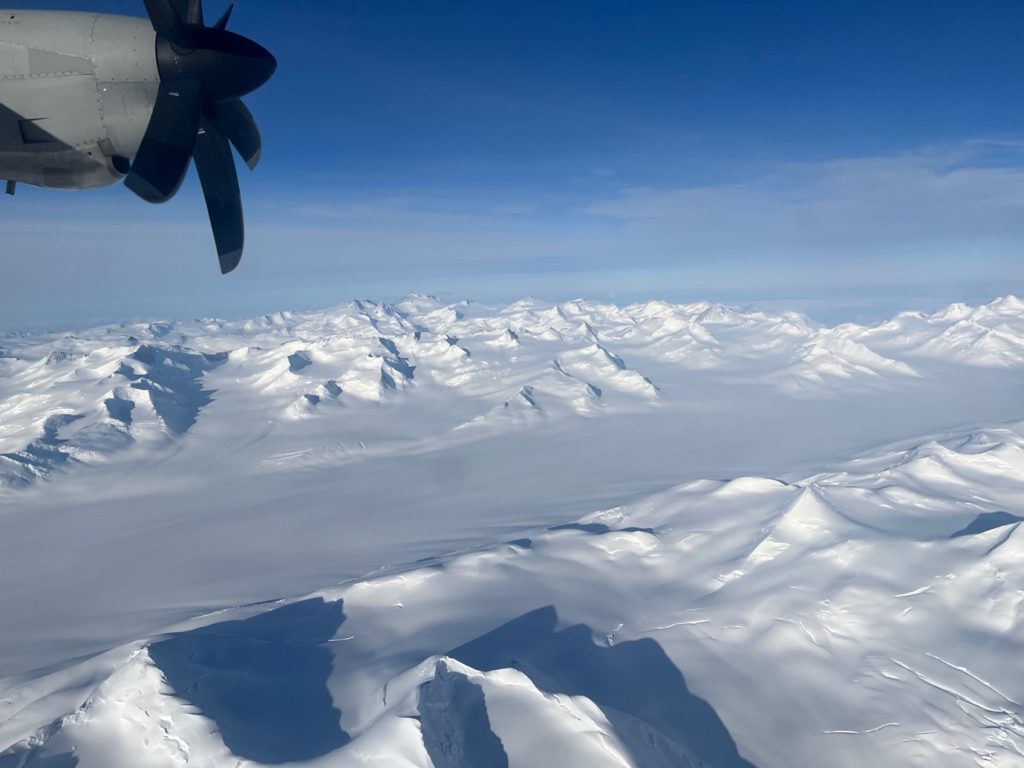
While boarding Hercules via the rear ramp at the plane’s back, comfort fades as we settle into seats made of seatbelt nets, surrounded by the deep hum of the massive engines; losing oneself in music or reading is swiftly abandoned, entering a trance state between sleep and wakefulness. Armed with a sandwich and apple juice for lunch, I refrain from drinking too much due to the lack of a toilet on board, but I appreciate this feeling of a rather spartan journey where everyone focuses on their mission, facing a mirror of the resilience required for Antarctic exploration. As the engines hum, faces gravitate towards small windows, seeking a glimpse. And there they are, vast expanses of ice in the Antarctic Ocean—a frozen picture etched in memory.
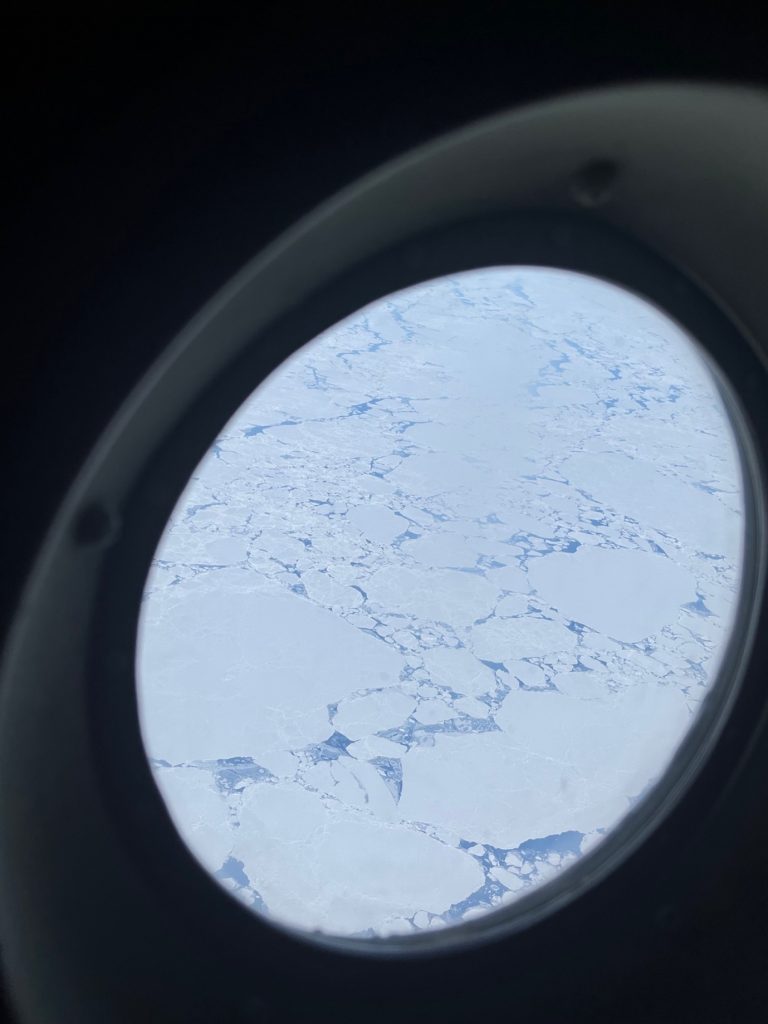
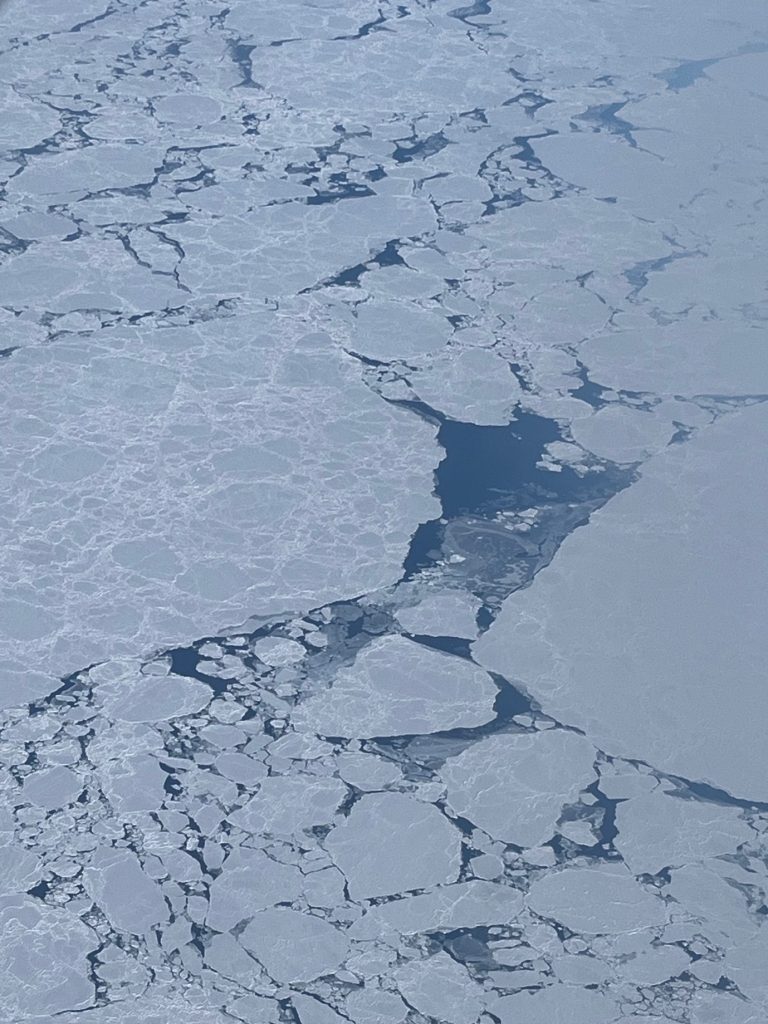
Mario Zuchelli Station is an Italian research station located at Terra Nova Bay in the Antarctic coast, a gathering spot for many Antarctic travelers. Some had been stranded here for days due to unfavorable flying weather. Each day we anticipated the DC20 crew’s flight to Concordia, often concluding with a card game in the main living room. Finally, on 10 November, the eagerly anticipated words echoed: “DC20 boarding to Concordia Station!”
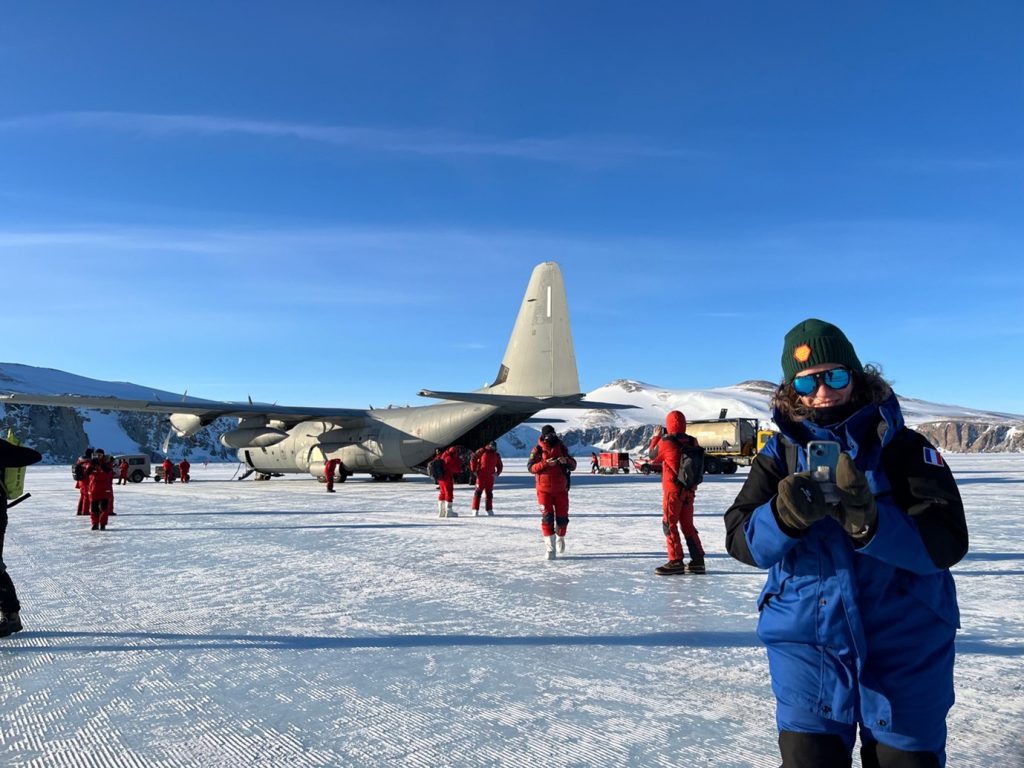
After a few hours in the non-pressurised Basler DC-3, our pilot Chuck confirmed our arrival at Concordia station. The station, concealed by the Antarctic plateau Dome C, welcomed us with its white towers. A collaborative effort between the French and Italian polar research programmes, Concordia is a hub for scientific exploration, offering an Earth-based analogue for space science research. It provides an environment simulating challenging conditions such as isolation and extreme environment faced during space travels, facilitating the study of human adaptation and countermeasures. Important data is gathered here to prepare future human space exploration in long-duration space missions to the Moon, Mars and beyond.
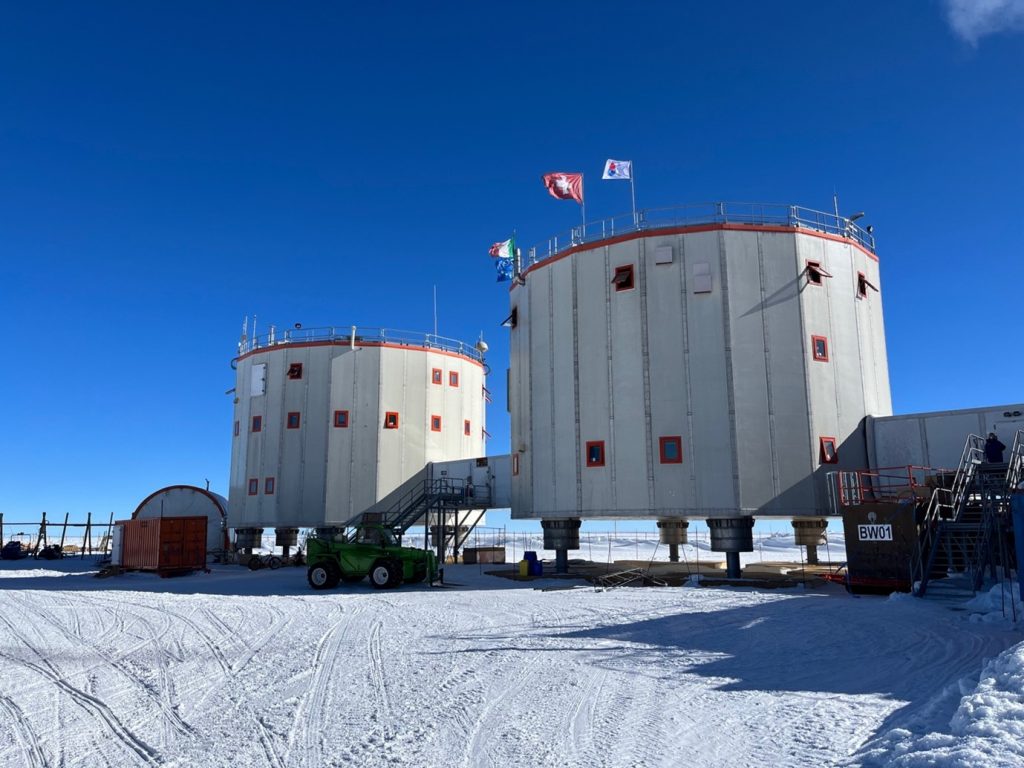
Exposed to temperatures of -37°C for the first time, we were unsure what to wear, so we simply put on everything we had available. But the warm welcome from the outgoing DC19 crew, who had survived the last 12 months here, allayed our fears and the cold was no longer a priority. The moment the door of the Basler DC-3 opened, we stepped onto the ice rink that will be our companion for the next 12 months. The following days prohibited extended physical activity due to Concordia’s low pressure, creating environmental conditions akin to an altitude of 3800 m above sea level. It is important for the human body to adapt to the low oxygen level to prevent high altitude sickness. We would soon understand how the extreme environment can swiftly turn life-threatening.
One of the highlights during this time was the raising of the Swiss flag at the Concordia station. Every year, the flag of the research MD is raised together with the French and Italian flags, a very emotional moment bringing up a deep connection with my home country and a feeling of pride. The sight of the flag in the middle of the icy expanse evoked a sense of identity and belonging and made the experience very special.
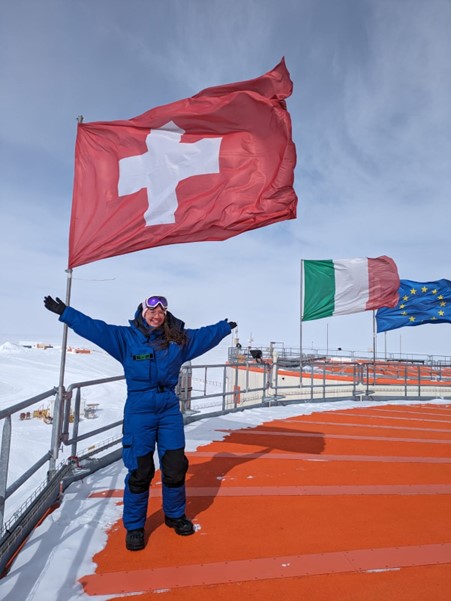
The upcoming month promises a flurry of activity. Scientists from around the globe will be at the station and conducting research while technicians maintain the station. By the end of January, a crew of 13 people including myself will endure the Antarctic winter, facing complete darkness, extreme temperatures and isolation. This endeavour will hopefully contribute valuable data offering insights into Earth’s environment, space exploration, and the adaptability of humans and technology to these extreme conditions.
I’ve been told that a voyage to this place isn’t for the faint-hearted, but for those who dare, it assures an unmatched experience. My first impression: the profound remoteness and beauty of the endless white expanse of ice undoubtedly make the challenges of the journey worthwhile.
To be continued…
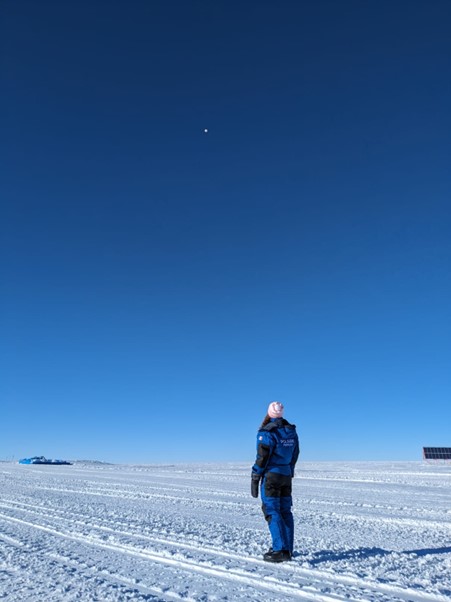
You could be the next person after Jessica to experience the endless white of Antarctica – apply now and embark on this incredible journey!



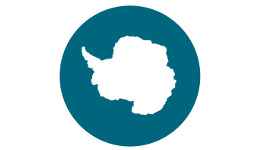
Discussion: 7 comments
Was für ein Abenteuer! Toller Bericht! Danke und natürlich: bald mehr davon! Gute Überwinterung!
Congratulations! Very interesting documentation!
I think Switzerland is very proud of having such a good research doctor for future space activities !
Good luck for the frozen upcoming temperatures!
Good luck and looking forward to further interesting blogs!
Wirst du weitere blogs posten? Would be great!!! ??
Hello, my name is Roland Isler. I am the editor of the Swiss Review – Regional News Oceania, based in Melbourne. I am in the process of publishing a little article about Switzerland’s involvement with Antarctica. I would love to include the photo of Jessica Studer with the Swiss flag. Would you grant me permission to use it? Obviously with the same caption/credits included, as well as the very first para re Jessica Studer. Looking forward to hearing from you. Thanks, Danke, Merci!
Hello Roland, thanks for your comment and feel free to use any of the photos on this blog (with, indeed, the same credits 😉 )!
Thank you very much Marie! Once published i will posy a link to the online version. P.S I think it is absolutely awesome what you guys are doing in Antarctica!